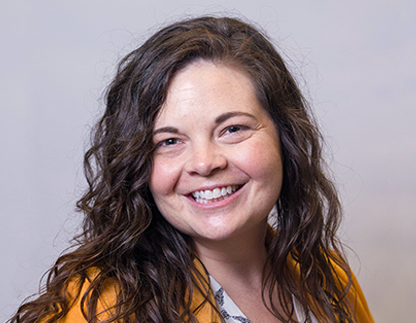Take a step back from time-to-time, take a break, then look at the bigger picture to ensure that what you are working on is the best path to your goal.”
Catherine “Cat” Majors
Postdoctoral Scholar in the Department of Chemical & Biological Engineering

Catherine “Cat” Majors is a postdoctoral scholar in the Department of Chemical and Biological Engineering in the McCormick School of Engineering. Her research focuses on split enzyme engineering towards the goal of creating better diagnostics for infectious diseases. In addition to her research, Cat previously served as the Evanston Co-Chair and Social Media Coordinator for the Northwestern University Postdoctoral Association (NUPA) and was a 2023 TGS McBride Award recipient.
How would you describe your research and/or work to a non-academic audience?
My work focuses on engineering proteins—the tiny machines that run cells—to create better disease sensors. The goal is to develop more accurate at-home rapid tests for infectious diseases, like the flu. I am also developing a set of tools to help engineers across my field understand how to design and engineer proteins with specific functions.
What have been some of the most memorable twists and turns of your career?
I switched fields when I transitioned from my PhD to my postdoc, which led to a steep learning curve at the start of my time at Northwestern. However, I am so excited that I decided to make that change and learn a new area to connect with my past research experiences.
Tell us what inspired your research and/or work.
My family is originally from fairly rural areas of Tennessee. When I was in high school, I realized for the first time that the healthcare available to my grandparents was very different than the superior healthcare available to people in more urban areas of the state. Since that time, I have been interested in developing new technologies that can increase access to healthcare in lower-resourced areas, with a specific focus on diagnostics. While my PhD focused more on the development and initial clinical testing of devices for bacterial infection detection, my postdoc has focused more on assay development to enable new, more accurate detection methods for biomarkers of disease.
What is the biggest potential impact or implication of your work?
My work will grant access to lab-quality diagnostic tests to those outside of lab settings, such as to individual people in their homes or to a rural primary care physician's office. The availability of such diagnostic tests will expand access to higher-quality healthcare to underserved populations.
Why Northwestern?
I chose to come to Northwestern mostly to work with my principal investigator (PI), Dr. Keith Tyo. I was drawn to both the research he was doing within the Center for Synthetic Biology and to the vibrant community of graduate students and postdocs in his lab when I visited. Living so close to Chicago and working within a university with so many resources for postdocs was also a huge draw!
How do you unwind after a long day?
I am a huge fan of trashy reality television, so I watch a lot of terrible (or terribly awesome!) TV like The Bachelor/Bachelorette, Love Island, and Love is Blind. Sometimes it is helpful when you are feeling down on yourself or your research to tune out and watch people acting somewhat ridiculous on TV! I'm also a prolific reader, play a few instruments, and knit for fun.
What books are on your bedside table?
Currently, I am reading North and South by Elizabeth Gaskell, a novel that focuses on social, class, and geographical disparities in Victorian-era England, and A Court of Thorns and Roses by Sarah Maas, a popular TikTok/"BookTok" choice for fantasy and romance readers. I just finished reading Once There Were Wolves by Charlotte McConaghy as part of NUPA's Book Club. It was an absolutely fantastic novel set in the Scottish Highlands about the reintroduction of wolves to that area, and it contains a murder mystery plot within. Anyone who loves reading should join us in the NUPA Book Club!!
What did you originally want to be when you grew up?
Actually, I’ve always wanted to be a scientist since I was a little girl. I have a pretty cringe-worthy picture I drew in the second grade saying, "When I grow up I will be a sintest [sic]." Spelling was never my strong suit!
What advice would you give your younger self or someone considering a similar path?
I have a bad habit of getting tunnel vision within my projects and life, which means I can miss the bigger picture. I would advise my younger self to take a step back from time-to-time, take a break, then look at the bigger picture to ensure that what you are working on is the best path to your goal.
Tell us about a current achievement or something you're working on that excites you.
I recently received a National Institute of Health Pathway to Independence Award (NIH K99/R00). This will fund the final year of my postdoc and the first 3 years of my independent faculty position. I was excited to finish my project at Northwestern with this fellowship and plan for my future faculty position!
Publish Date: February 13, 2023
If you know a graduate student, postdoctoral scholar, graduate faculty member, staff member, or a member of our TGS alumni population who would make a great candidate for our TGS Spotlight Series, please complete this brief TGS Spotlight Series Nomination Form.